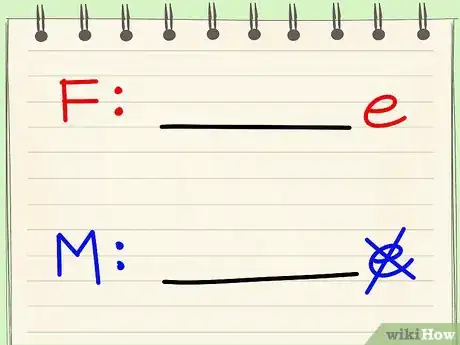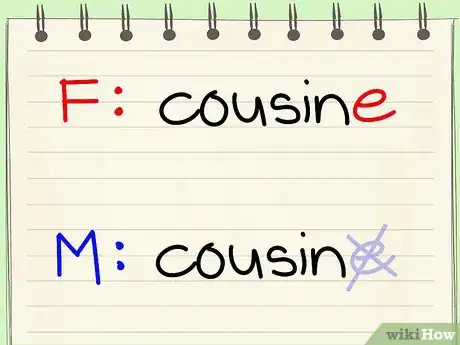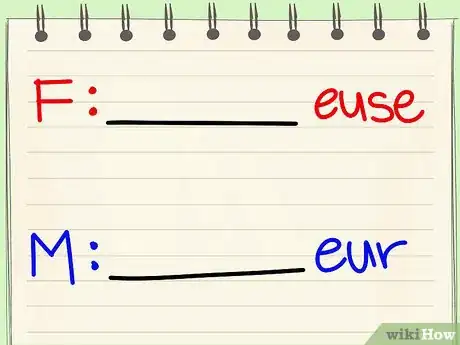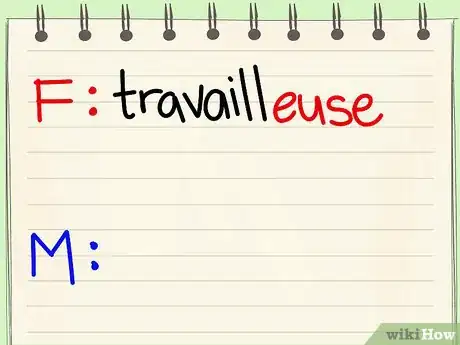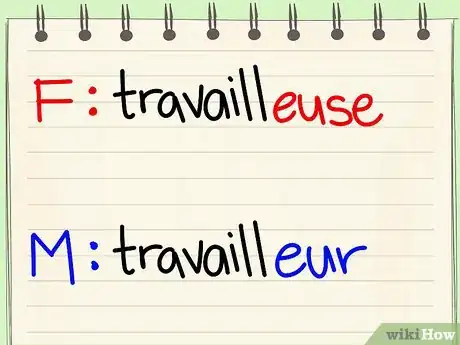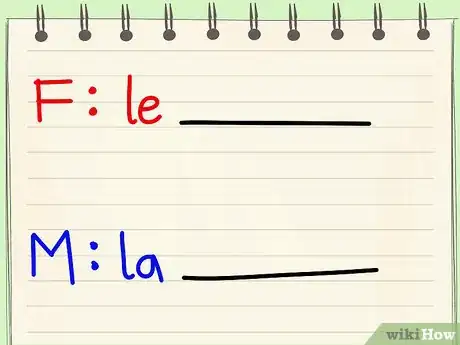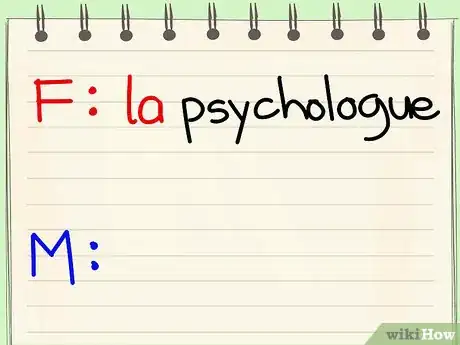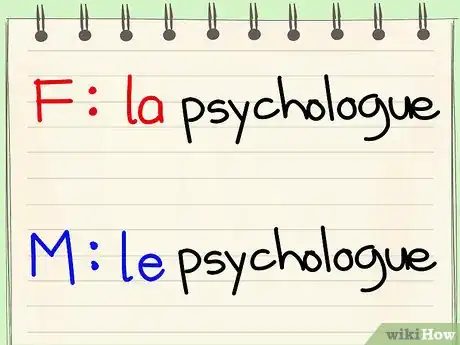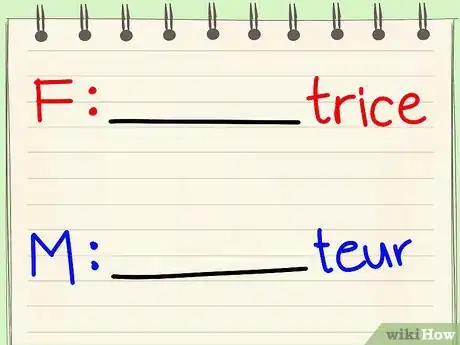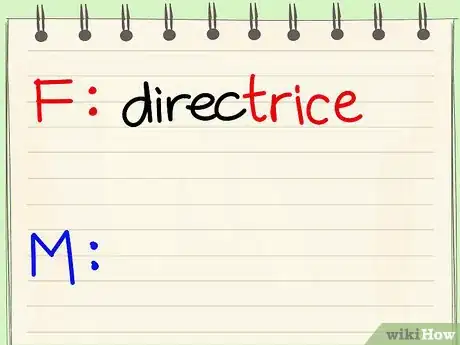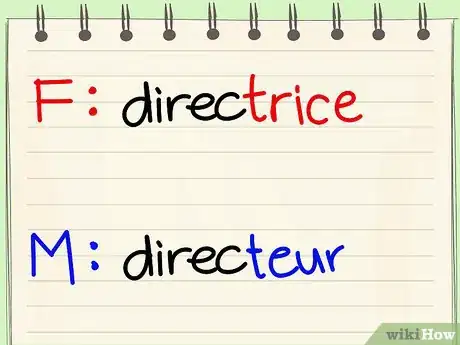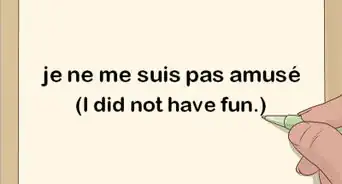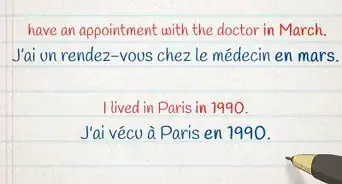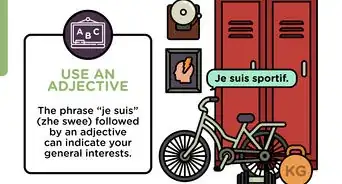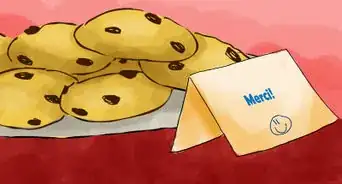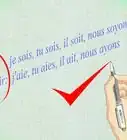X
wikiHow is a “wiki,” similar to Wikipedia, which means that many of our articles are co-written by multiple authors. To create this article, 10 people, some anonymous, worked to edit and improve it over time.
This article has been viewed 33,281 times.
Learn more...
French and English are two totally different languages. One of the major differences is that in French nouns like "friend" have two different forms depending on whether you are talking about a female friend or a male friend!
Steps
Method 1
Method 1 of 4:
Words That Add an "E" to the End
-
1Look at the word. See if it currently ends in an "e" (such as amie, employée, or cousine) or ends in another letter (such as ami, employé, or cousin). If it ends in an "e" it is most likely feminine.
-
2If you want the noun to be for a female, make sure it ends in an "e". If it should be male, omit the "e".
Advertisement
Method 2
Method 2 of 4:
Words That Change "eur" to "euse"
-
1Look at the word. See if it currently ends in "eur" (such as travailleur) or ends in "euse" (such as travailleuse). [1]
-
2If you want the noun to be for a female, make sure it ends in "euse". If it does not, drop the "eur" and add "euse".
-
3If you want the noun to be for a male, make sure it ends in "eur". If it does not, drop the "euse" and add "eur".
Advertisement
Method 3
Method 3 of 4:
Words That Change Only the Article
Method 4
Method 4 of 4:
Words That Change "teur" to "trice"
-
1Look at the word and see if it ends in "teur" (such as directeur), or "trice" (such as directrice).
-
2If you want it to be female, make sure it ends in "trice". If it does not, drop the "teur" and add "trice".
-
3If you want it to be male, make sure it ends in "teur". If it does not, drop the "trice" and add "teur".
Advertisement
Community Q&A
-
QuestionHow do I make feminine and masculine words for colors?
 Community AnswerHere's a basic list of the colors in both genders for you: Masculine: blanc (white), noir (black), rose (pink), rouge (red), bleu, orange, jaune (yellow), gris (grey/gray), marron (brown), vert (green), violet (purple). Feminine: blanche, noire, rose, rouge, bleue, orange, jaune, grise, marron, verte, violette
Community AnswerHere's a basic list of the colors in both genders for you: Masculine: blanc (white), noir (black), rose (pink), rouge (red), bleu, orange, jaune (yellow), gris (grey/gray), marron (brown), vert (green), violet (purple). Feminine: blanche, noire, rose, rouge, bleue, orange, jaune, grise, marron, verte, violette -
QuestionHow do I change the word if it ends with double consonant and an "e"?
 Community AnswerIt depends on the word, but the feminine form is most likely identical to the masculine one in this situation. For example: "un oracle" -> "une oracle." However, certain words have an already specific feminine form. For example, "un comte" -> "une comtesse." It is better to check a dictionary for the feminine form in case it already exists.
Community AnswerIt depends on the word, but the feminine form is most likely identical to the masculine one in this situation. For example: "un oracle" -> "une oracle." However, certain words have an already specific feminine form. For example, "un comte" -> "une comtesse." It is better to check a dictionary for the feminine form in case it already exists. -
QuestionWhat happens if the word ends in the letter "d"?
 Community AnswerOne example, Allemand, can be easily changed to the feminine form by simply adding an e to the end, making the word Allemande. This should be true for all French nouns ending in d.
Community AnswerOne example, Allemand, can be easily changed to the feminine form by simply adding an e to the end, making the word Allemande. This should be true for all French nouns ending in d.
Advertisement
About This Article
Advertisement
